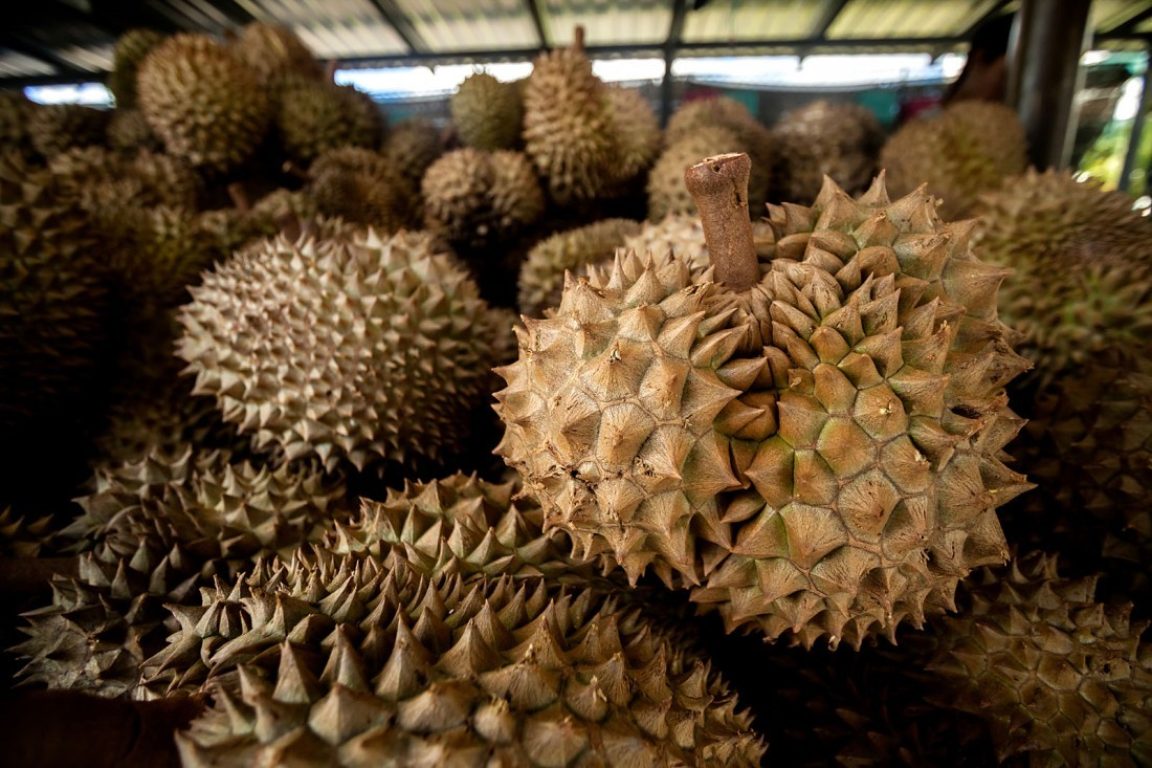The Kingdom of Thailand is blessed with bountiful fruit harvests. Few countries on Earth enjoy such a wide selection of unique tropical yields. Upon first arriving anywhere in the country, a must-have and dazzling experience is found at the local fresh market or roadside fruit stand. Here, juicy and exotic produce consistently win the heart of taste buds year-round.
In fact, The Kingdom of Thailand is considered a heaven for fruit lovers and fruitarians. Rare and inexpensive selections draw fruit tourists! Bangkok is often known as “The Big Mango” moreover, for its perpetual surplus. It is a distribution point of that fruit, which parallels New York City’s moniker as “The Big Apple” (a regional hub for apple orchards).
In Thailand, more “common” delicious fruits are extremely exotic to westerners. Occasionally found alongside the so-called “King and Queen of Fruits” are: dragonfruit, lychee, pomelo, rambutan, rose apple, and guava. Such delights are the topic for another article, somewhat related with the famous event: Thailand’s vegetarian festival in Phuket Island.
When in Thailand, do as the Thais by enjoying the world’s finest selection of fruits.
WHAT ARE THE KING AND QUEEN OF FRUITS?
On nearly every street corner or market, revelers can start to experience firsthand about their hungry question.
Most notable is the “King of Fruits” or durian. His Majesty’s consort, the “Queen of Fruits” is the beloved mangosteen.
Thailand is the lead exporter of these two world-renown, rare delicacies. Difficult to find outside of the region, domestically they are found everywhere from the beaches of Phuket to the hills of Chiang Mai.
Sometimes known as fruits of the gods, the King and Queen (durian and mangosteen) are tropical delights noted for their superior nutritional qualities, taste/texture; and other outstanding characteristics to be described in this article.
The majestic pair has complimentary effects upon the human body’s constitution. Durian increases the traditional (Ayurvedic and Chinese Medical) element of “fire” in one’s body while mangosteen has a cooling, or “water” effect. Therefore, serious fruit and health lovers often enjoy them in unison.
WHAT IS THE QUEEN OF FRUIT?
Mangosteen is the national fruit of Thailand. It grows throughout Southeast Asia and originated from Indonesia.
Legend has it, Queen Victoria offered a reward of 100 pounds sterling to any adventurer who delivered her the fresh fruit. It is extremely difficult to export due to a brief shelf life. Therefore, this fruit is seldom seen in the western world.
Mangosteen does not actually resemble mango at all. The shell is bulky and purple while the inner fruit is light and has a mild aroma. If mangosteen’s husk is too strong, it is overripe. If green, it is not yet ripe.
During harvest season and especially in July, Thailand becomes inundated with the divine fruit. Even in tourist-based economies such as Phuket, one can find kilos of mangosteen for 15 to 30 baht (between only fifty cents and one dollar)! Flatbed trucks caravan through the streets announcing “mangosteen, 20 bat per kilo, mangosteen, we have freshly harvested mangosteen” in the Thai language. Upon hearing it, locals rush out of their homes and workplaces. Smiling and without any regret, they purchase a hefty bag of three kilos.
When opening the fruit, be gentle to avoid splashing purple juice as you squeeze the middle. Pluck or bite-out the luscious white core, devour heaven.
With antioxidants, anti-inflammatory and antibacterial properties; the Queen of Fruit is one of our immune system’s greatest, albeit little-known allies.
The taste is a perfect combination of sweet and tangy. This divine fruit’s flavor and soft texture seem to awaken the tongue in jolts of ecstasy.
WHAT IS THE KING OF FRUIT?
Durian is world renown for two seemingly paradoxical reasons:
It has a notoriously strange aroma, yet is highly acclaimed for its delectable taste.
Durian trees grow up to 40 meters tall and are commonly fertilized by bats. With fruits reaching 30 centimeters long and weighing up to 3 kilograms, harvests are large.
This emperor wears impressive armor as well; its strong brown shell is covered in sharp thorns. Hidden within that hard, sharp and dark outside is the soft, smooth, and divinely golden edible inside.
Upon falling from a wild tree and cracking, all kinds of animals from tigers to monkeys, birds and elephants swiftly pounce.
High fiber content is complimented by plenty of vitamin B nutritional sustenance. Careful however, durian does not mix well with alcohol (among people with week conditions, they may feel overheated and sick).
Durian is enjoyed across South East Asia, especially at the annual Durian Festival in Chantaburi Thailand each year. It has been known to the Western world for only about 600 years.
The King of Fruits is also a powerful aphrodisiac; its erotic properties are well celebrated behind closed doors: “When durians fall, ladies dresses rise.”
Durian is banned from many confined public spaces due to the smell: “It smells like hell on the outside, and tastes like heaven on the inside.”
Therefore, everyone must avoid bringing the fruit on public transportation. Also, travelers may expect to pay hefty fines for enjoying in rented accommodation. The smell makes the rental “out of service” for one or two days.
That scent however, does not stop millions from nearly worshipping the King of Fruits. It’s rare, soft textures and indulgent flavors are regal beyond words can describe. Many come to enjoy the smell moreover, an acquired sense.
Whether enjoying durian or mangosteen, these tropical delights are among the greatest and most sought-after produce found worldwide.
